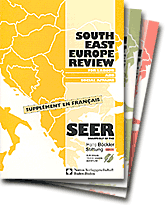Conflict prevention and social issues in South-East Europe
Conflict prevention and social issues in South-East Europe
Author(s): Sabine Riedel, Michael KalmanSubject(s): Politics / Political Sciences
Published by: Nomos Verlag
Summary/Abstract: For many centuries, the Balkans have been perceived as a powder keg. The image of ethnic hate, irrational nationalism and massacre is dominant in the media. The violent incidents in Kosovska Mitrovica between Albanians and Serbs at the beginning of the year seem to symbolise the whole of this European region. “They can’t live together, they’re too different,” is the seemingly plausible explanation of these cycles of violence. On the one hand, the international community has consistently required the building and strengthening of a multicultural society in Kosovo but, as the Special Representative of UNMIK, Bernard Kouchner, pointed out on 13 December 1999 in Prishtina in presenting the Agenda of Coexistence: Unfortunately, reconciliation and the creation of a genuine multi-ethnic society are not possible today, but must wait for tomorrow. (UNMIK, 1999) It is generally noted that the discourse on ethnically-divided societies, cultural differences and multiculturalism has so far mostly ignored social issues. The missing links to mass poverty, social exclusion and decline, mass unemployment and weak social security systems has serious consequences because the researchers, political advisors and politicians dealing with the political strategies in which to integrate the south-east European area into Euro-Atlantic structures do not have suitable analytical tools to analyse the roots of violence and to draw out sustainable concepts concerning conflict prevention. By way of contrast, we want to stress the primacy of social issues in the Balkans and to point out that the ethnic perspective on the situation in the region is too limited for the outlining of appropriate measures for the generation of peaceful and prosperous development. This contribution seeks to analyse the link between poverty and cycles of violence in the Balkans. Besides Kosovo, there are numerous conflict situations arising from the latent pre-war constellations of the region. So, it is of great importance to strengthen conflict prevention efforts through an integrated poverty reduction strategy. In this context, important actors and mechanisms, like the International Monetary Fund, the Stability Pact for South-East Europe and, last but not least, the trade unions, have deep responsibilities in preventing the outbreak of violent conflicts.
Journal: SEER - South-East Europe Review for Labour and Social Affairs
- Issue Year: 2000
- Issue No: 03
- Page Range: 51-63
- Page Count: 13
- Language: English

